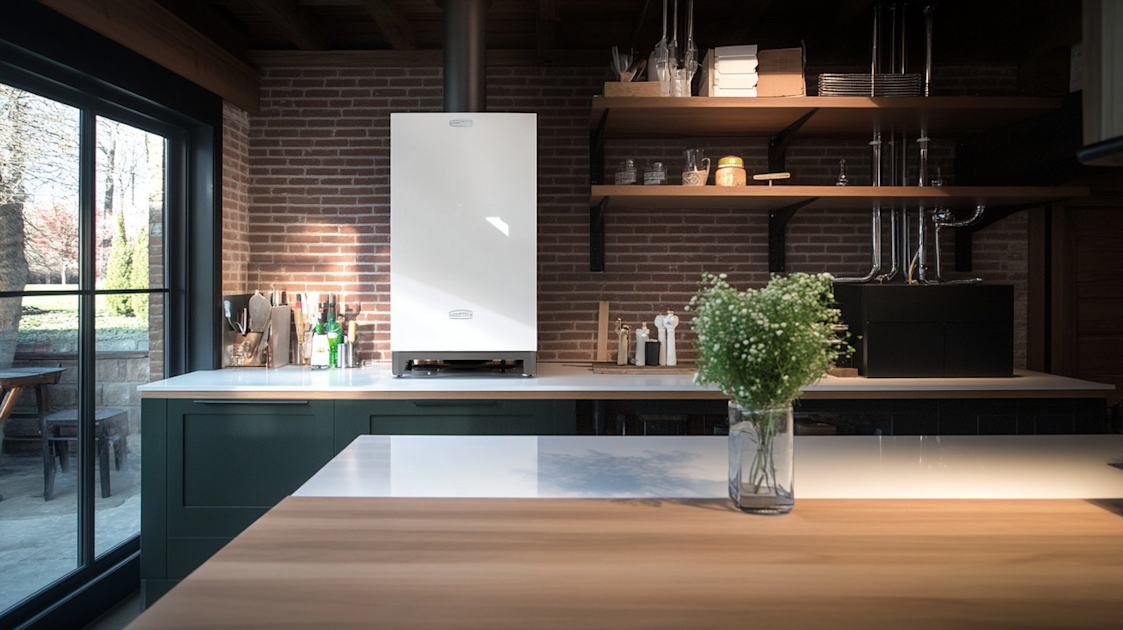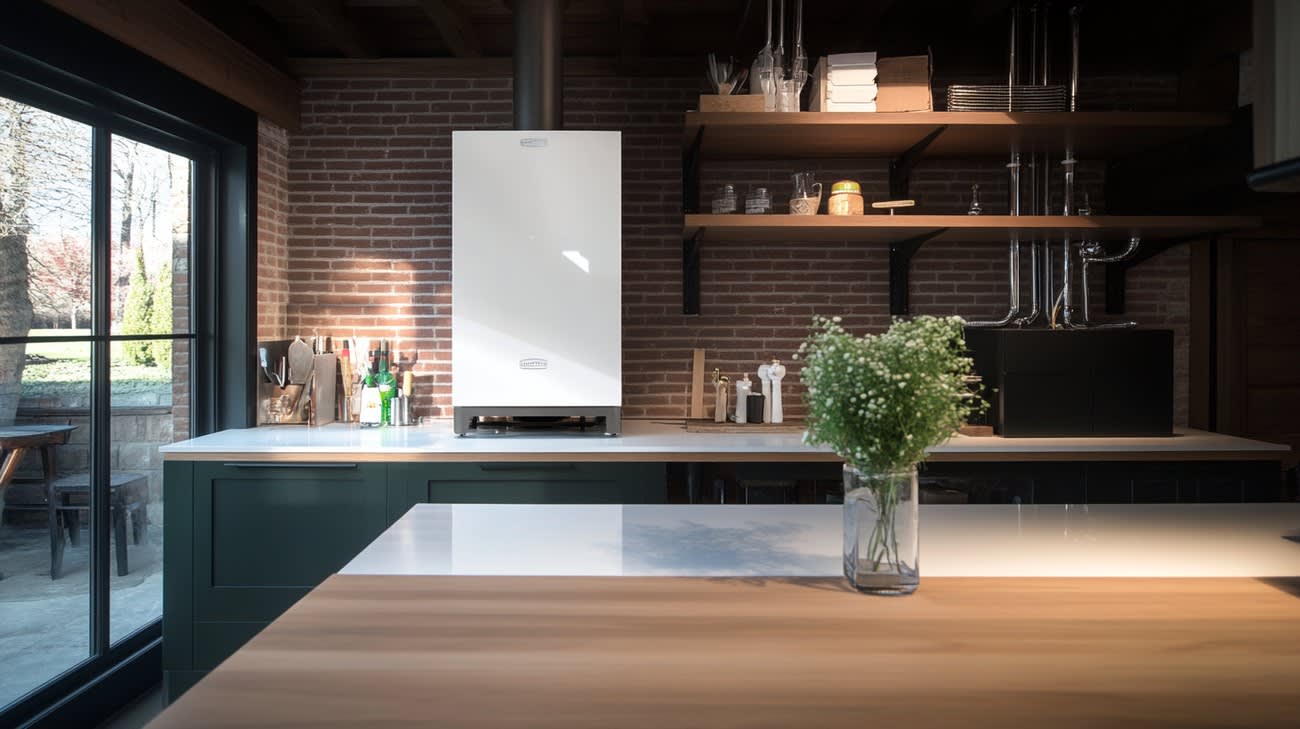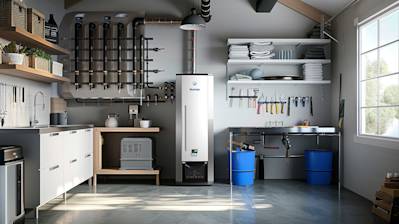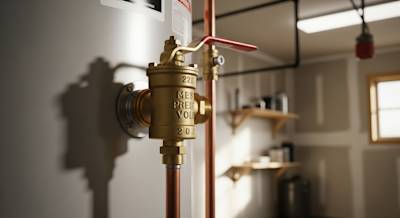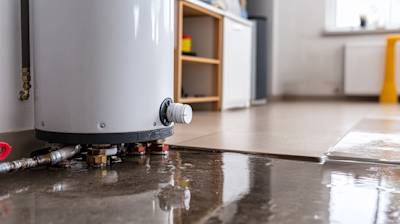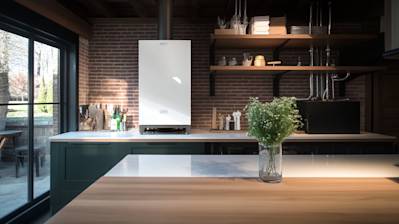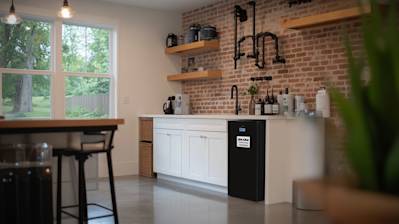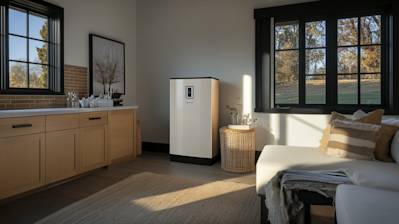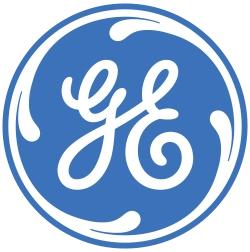Indirect water heaters are gaining popularity due to their energy-efficient design and operated performance. If you’re exploring new hot water options, you should consider an indirect water heater. This article provides you own in-depth analysis of indirect water heaters—understand the definition, how they work, their benefits, and their installation process.
What is an Indirect Water Heater?
An indirect water heater is a highly energy-efficient water heating system. It uses the main furnace or boiler to heat a fluid that's circulated through a heat exchanger in the storage tank. Essentially, the home’s heating system is used to heat up water indirectly, unlike regular water heaters that utilize direct energy sources.
The essential components include:
- Boiler: This is the heat-producing source.
- Heat Exchanger Coil: Here, heat transfer takes place.
- Water Storage Tank: The heated water is kept here for use.
How Does an Indirect Water Heater Work?
Understanding how indirect water heaters work can give you a better idea of their efficiency and suitability for your home. So let's dissect the operation of these water heaters:
Heat Exchange Process
The indirect water heater methods use a heat transfer process where the boiler or furnace heats a fluid, usually water or an antifreeze mixture, circulated through the heat exchanger coil in the storage tank.
Thermostat Control
The thermostat operates independently of the home’s heating system. When the water stored in the tank drops below the desired temperature, the thermostat signals the boiler to turn on.
Continuous Supply of Hot Water
Once the water reaches its required temperature, the boiler turns off, but the water remains heated in the tank, ready for distribution around the house whenever needed.
Benefits of Indirect Water Heater
There’s a reason why homeowners are opting for indirect water heaters. Here are a few of their benefits:
- Energy Efficiency: Indirect water heaters are more energy-efficient as compared to traditional direct-fired heaters—providing substantial savings over the product lifetime.
- Hot Water Supply: They are capable of providing a larger volume of hot water at a more consistent temperature.
- Longevity: They often come with longer warranties due to a reduced risk of burnout or rusting, supplying hot water reliably for years to come.
Installation of Indirect Water Heaters
The real linchpin of your indirect water heater system is the boiler. The installation process depends on your home's existing heating system, and it is recommended to use a professional to handle the installation process. Here’s a basic installation process for reference:
- Place your hot water cyclinder.
- Install the indirect coil.
- Connect the indirect coil to the boiler.
- Install the necessary pipework.
- Install electrical connections.
- Fill up the system and check for leaks.
- Connect the system to the thermostat and finalize the setup.
When done properly, this installation ensures you get the most out of your energy-efficient indirect water heater.
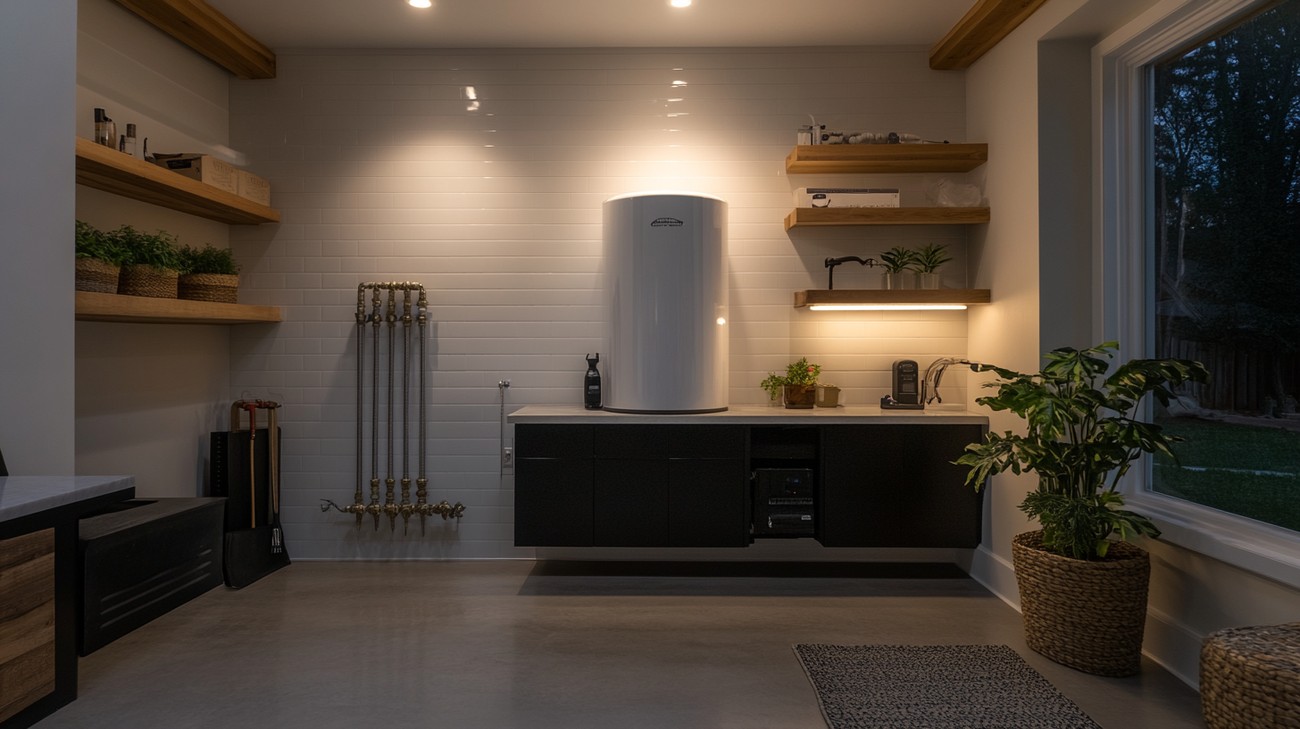
Frequently Asked Questions about Indirect Water Heater
What is the Difference Between an Indirect and Direct Water Heater?
The main difference between indirect and direct water heaters is the method used to heat the water. Direct water heaters use a flame or an electric resistance coil directly immersed in the water. On the other hand, indirect water heaters use heat transfer from the heat produced by a boiler or a furnace.
How Efficient is An Indirect Water Heater?
Indirect water heaters can be highly efficient, mainly when integrated with a boiler that is designed for low water temperatures. They also typically have a higher recovery rate than a standalone water heater, so they can deliver hot water quickly and efficiently.
How Long Does an Indirect Water Heater Last?
The lifespan of an indirect water heater largely depends on the quality of the water in your region, how well it is maintained, and the construction quality of the equipment. However, many systems last between 20 to 30 years, which is longer than most direct water heaters.
How Much Does an Indirect Water Heater Cost?
The cost can vary depending on the size and brand you choose. Generally, the unit itself will cost anywhere from $800 to $2,000. Including the installation and labor costs, the total will usually be between $1,500 and $4000.
Can I Use an Indirect Water Heater with any Boiler?
For the most part, yes. An indirect water heater can work with most types of high-efficiency boilers. However, the efficiency of the indirect water heater could be limited by the boiler's capacity and efficiency.
What is the Maintenance Procedure for an Indirect Water Heater?
Maintenance procedures for an indirect water heater include checking and cleaning the boiler and heat exchanger, inspecting the water heater for leaks, and periodically draining and flushing the tank to remove sediment.
Can an Indirect Water Heater be used in a Large Building or Multi-Family Residence?
Yes, indirect water heaters can effectively be used in large buildings or multi-family residences. Many systems are explicitly designed for larger-scale applications and can provide a steady supply of hot water.
How Fast Can an Indirect Water Heater Heat Water?
The speed at which an indirect water heater can heat water depends on the capacity of your boiler system. However, indirect models typically have a high recovery rate and can deliver hot water faster than most direct water heaters.
Can you retrofit an existing boiler to work with an indirect water heater?
In most cases, yes, an existing boiler system can be retrofitted to work with an indirect water heater. It would involve integrating the indirect water heater into the boiler system and ensuring the boiler can provide the necessary heat for the indirect system.
Is there any risk of Legionella bacteria with indirect water heaters?
Properly operated and maintained indirect water heaters have a very low risk of Legionella bacteria growth. It is essential to keep the water temperature above 140 degrees Fahrenheit in the entire system, as these bacteria cannot survive in such high temperatures.
Can an indirect hot water heater work off-grid?
If your indirect water heater is connected to a boiler that uses either propane, gas, or oil, and you can supply those fuels, it should work off-grid. But further technical expertise might be needed to confirm this on a case-by-case basis.
How does an indirect water heater protect itself from overheating?
Most indirect water heaters are equipped with safety features such as temperature and pressure relief valves. So, if the water temperature or pressure gets too high, the valve opens and discharges water to reduce pressure or temperature, thus preventing possible overheating.
Are indirect hot water heaters environmentally friendly?
Overall, indirect water heaters can be considered environmentally friendly due to their high efficiency. They use residual heat from a boiler or a furnace, which essentially results in less energy consumption compared to traditional water heaters.

Pros of Indirect Water Heaters
Energy Efficiency
Lower Energy Consumption
One of the biggest benefits of an indirect water heater is its energy efficiency. Since it connects to your boiler system, it saves energy by using the existing heat produced by the boiler to warm your water. Whenever your boiler is operating to keep your home warm, the water heater takes advantage of this heat to function, drastically reducing the overall energy consumption and savings on utility costs in the long run.
Less Usage of Power
Indirect water heaters are designed to store large amounts of heated water. This ability extends the intervals between the system’s need to heat more water. Consequently, this results in less frequent usage of power, making indirect water heaters extremely energy-efficient and cost-effective over time.
Durability and Lifespan
Long-Lasting Equipment
Indirect water heaters have longer lifespans compared to conventional water heaters. Since the boiler carries the heavy job of heating the water, the water heater doesn’t experience the similar wear and tear, extending its lifespan. Many indirect water heaters can last up to two or even three decades with regular maintenance.
Less Wear and Tear
With indirect water heaters, the risk of sediment build up and other common issues found in direct water heaters is greatly reduced. This is primarily due to the fact that, unlike in traditional water heaters where the heating elements are immersed in the tank, in indirect water heaters, the boiler unit handles the actual heating. This results in less wear and tear on the system overall, extending its lifespan.
Operating Cost and Reliability
Lower Operating Costs
Over time, the initial investment on an indirect water heater can be recovered through cost savings. Lower energy consumption means cheaper utility bills. Even though the upfront cost of these units may be higher than other types of heaters, the monthly savings eventually add up, making indirect water heaters a cost-effective choice in the long run.
High Reliability
Indirect water heaters are generally more reliable than their direct counterparts. An indirect water heater can provide a steady supply of hot water even in the coldest months when the boiler heating the water is already running to heat up the house.
Cons of Indirect Water Heaters
Installation and Upfront Costs
High Initial Investment
One downside of indirect water heaters is their high initial cost. The equipment itself is more expensive than traditional water heaters, and the installation can be more complex and, consequently, more costly.
Needs a Boiler System
Indirect water heaters must be connected to a boiler system to operate, which can be an issue if your home doesn't already have one. If your home doesn't currently have a boiler, the cost and the complexity of installing one should be factored into the overall expenses.
Space Requirement
Large Physical Footprint
Indirect water heaters tend to be larger than other types of water heaters, which may prove problematic if space is a concern. They require enough space for not only the heater itself, but also for the additional plumbing and the boiler system.
Dependence on Boiler
System Dependency
An indirect water heater relies on the central heating system to heat the water. If there are any problems with the boiler, this could leave you without hot water until the issue is resolved. This reliance on the boiler to heat water could be a disadvantage, especially during the summertime, when the central heating is typically off.
Potential for Overwork
In cold weather when the demand for home heating is high, there’s potential to overwork the boiler by using it to warm both the home and the water. This could result in less than ideal water temperature if the boiler cannot keep up with the high demand.
Maintenance
Regular Maintenance Needed
Indirect water heaters require regular maintenance to ensure their efficiency over a longer period of time. Failure to properly maintain the system can cause issues such as corrosion and leaks. Therefore, homeowners also need to take into account the ongoing costs associated with upkeep.
Complex Repairs
Given the complexity of the system, any repair work usually requires a professional heating engineer. This could increase your ongoing costs compared to simpler water heating systems and, in some cases, result in longer wait times for repairs to be completed.

Myths and Misconceptions About Indirect Water Heaters
When it comes to indirect water heaters, there are many myths and misconceptions that prevent people from understanding and maximizing the potential of these efficient appliances. Let's debunk some of these misconceptions.
Myth 1: Indirect Water Heaters Are Expensive to Install
Many people shy away from indirect water heaters because they believe they are costly to install. However, while the initial cost might be higher than that of traditional water heaters, the long-term savings usually make up for it. Indirect water heaters have a longer lifespan, typically 20 to 30 years, and thanks to their efficiency, they can lead to significant savings on energy bills in the long run.
Myth 2: They Use More Energy Because of the Two-Step Heating Process
Contrary to popular belief, indirect water heaters are among the most energy-efficient water heating solutions available. They use the heat produced by your boiler to heat the water, which is more efficient than heating water directly. This process can lead to less energy usage, saving homeowners on their energy bills.
Myth 3: Indirect Water Heaters Are Slow
Some people are under the impression that the two-step heating process makes indirect water heaters slow. However, the reality is that indirect water heaters can actually provide hot water faster than traditional models. They keep a tank of hot water ready and available, which can lead to almost instant hot water when you turn on the faucet.
Myth 4: They Require a Lot of Maintenance
Like all appliances, indirect water heaters do require regular maintenance to function optimally. However, the maintenance required is not extensive or overly demanding, contrary to what some believe.
Myth 5: You Can't Use an Indirect Water Heater Without a Boiler
While it's true that indirect water heaters work best when paired with a boiler, this doesn't mean they can't function properly with other heating systems. Some indirect water heaters can be used with solar heating systems, heat pumps, and more. It's all about pairing the right indirect heater with your particular home heating system.
Myth 6: They Take up a Lot of Space
Many people believe that since an indirect water heater requires a boiler, it means that the whole setup will take a lot of space. However, many modern boilers are compact and designed to fit into small spaces. Indirect water heaters themselves are also compact and can even be wall-mounted in some cases.
Myth 7: All Indirect Water Heaters Are Created Equal
There's a misconception that all indirect water heaters are the same. However, quality and efficiency can vary greatly between different models and manufacturers. When choosing an indirect water heater, it's essential to research different models, read reviews, and consider the size, efficiency, and durability of the water heater.
Myth 8: They Are Not Suitable for Large Households
It's often thought that because indirect water heaters make use of an additional unit, the boiler, they may not meet the hot water demands of larger households. However, the reality is different. With the right size, an indirect water heater can comfortably meet the demands of a large household.
In conclusion, it's evident that not all commonly held beliefs about indirect water heaters hold water. When considering an indirect water heater, it's essential to separate fact from fiction and not let misconceptions cloud your judgment.
Summary
So, summing up, an indirect water heater is a game-changer that can provide unlimited hot water at home. It does so by merging with your existing heating system, making it an energy-efficient choice. With no need for a separate fuel source, it can definitely make life a little easier, a bit warmer, and a whole lot comfortable.
Next, the indirect water heater stands out for its longevity and safer operation. As these units are not subjected to constant high temperatures or open flame, they keep functioning well for longer periods. Plus, the added benefit of not having a pilot light means less risk of unexpected accidents. It's one of those investments that doesn't just heat water, but also gives peace of mind.
Finally, let's not forget the significant savings that an indirect water heater brings to the table. Yes, the upfront cost can be a bit high, but the return over time is fantastic. You can reduce energy usage, lower electricity bills, and avert frequent maintenance or replacement costs. Bottom line - you get your hot showers, and your pocket gets a break from excessive expenses. An indirect water heater, therefore, is a smart choice that combines comfort, safety, and savings!
About KYPD Plumbing
KYPD Plumbing is a reputable and trusted plumbing company based in the heart of Lexington, KY. With years of experience under our belts, we pride ourselves on delivering top-notch plumbing services to both residential and commercial customers. Whether it's a small leak or a major installation, our team of highly trained and certified professionals is dedicated to resolving your plumbing issues promptly and efficiently. With a strong commitment to quality workmanship and customer satisfaction, KYPD Plumbing is your go-to service provider for any plumbing needs in Lexington.
Tags: water tank, water heating system, energy-efficient,

